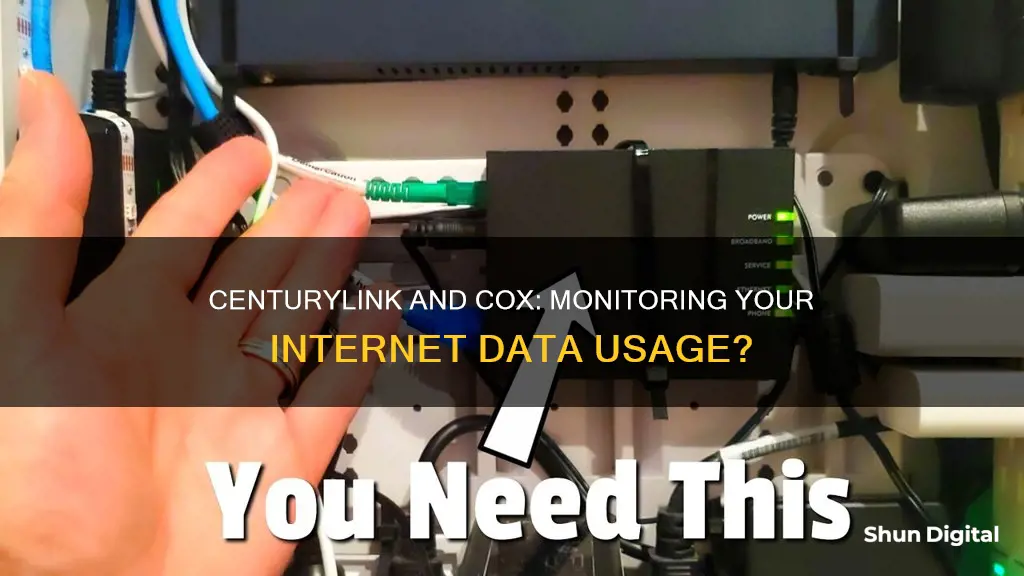
CenturyLink and Cox are two popular internet service providers (ISPs) that offer different connections and speeds with their internet plans. Cox's cable internet service presents more plan options, but Quantum Fiber from CenturyLink is the better value. Cox's cable network gives it the flexibility to offer a number of speed tiers, including a decent prepaid internet plan. While fiber-optic lines present the same speed potential or better, CenturyLink's fiber service does not offer quite the same speed or plan variety as Cox. Cox's internet plans come with a one-year contract if you want the lowest introductory pricing. If you do sign a one-year service agreement with Cox and cancel service before it's up, expect an early termination fee of $120, regardless of how long is left in your contract when you cancel. CenturyLink doesn't require contracts at all. Cox's internet plans automatically come with 1.25 TB (terabytes) of data every month to help you connect to everything important.
| Characteristics | Values |
|---|---|
| Data Cap | Cox has a 1.25 TB cap on all of its plans. CenturyLink has a 1 TB cap on its plans. |
| Overage Charges | Cox charges $10 per 50GB block of data after the first courtesy credit. CenturyLink does not charge for going over the data cap. |
| Notification of Data Usage | Cox automatically notifies users via text and/or email when certain thresholds of data usage are passed. CenturyLink does not appear to have a similar system in place. |
| Data Usage Tracking | Both Cox and CenturyLink have tools to help users track their data usage. |
What You'll Learn

Cox's data usage and monitoring
Cox offers a range of internet plans with data allowances and usage monitoring. All Cox internet plans include a monthly data allowance of 1.25 terabytes (1280 gigabytes), which is ample for most households. This data allowance is included in the monthly fee, and there are no additional charges for data usage within this limit.
Cox provides tools to help customers monitor their data usage. Customers can register for a Cox user ID and password to access data usage information and receive notifications via text message or email when they reach certain data thresholds. The Cox app also provides data usage details, and a widget can be added to the phone's home screen for quick access.
Customers who exceed their data allowance have the option to purchase additional data blocks of 50 gigabytes for $10 each, up to a maximum overage charge of $100 per month. Alternatively, Cox offers an unlimited data plan for an additional monthly fee.
It's worth noting that some Cox customers have reported issues with data usage monitoring, claiming that their recorded usage did not align with their actual internet usage patterns. These discrepancies have led to concerns about potential inaccuracies in Cox's data metering systems.
In summary, Cox provides its customers with a substantial data allowance and tools to monitor their usage. While there have been some reported issues with data usage monitoring, Cox offers options to manage data usage and the ability to purchase additional data or opt for an unlimited plan if needed.
Taiwan's Utilities: Monitoring Residential Peak Usage?
You may want to see also

CenturyLink's data usage and monitoring
CenturyLink offers two types of internet service: DSL, which runs through a phone line, and fiber internet, which provides much faster speeds through fiber-optic cables.
CenturyLink's DSL service is available at a starting price of $50 per month, with download speeds of up to 140 Mbps. However, the actual speed you get depends on your location, with only around 28% of households being able to get speeds of 100 Mbps or higher.
CenturyLink's fiber internet plans offer two speed options: 200 Mbps at $50 per month, or gig service at $65 per month. Both plans offer a better value than comparable plans from Cox and come with much faster upload speeds.
CenturyLink does not have data caps, so you don't have to worry about overage charges. However, frequent or excessive overages could violate CenturyLink's terms of service and excessive use policy.
CenturyLink does not require contracts for its internet plans, so you can cancel at any time without paying an early termination fee.
Cox, on the other hand, offers cable internet service with a range of plan options. Its internet plans come with a monthly data cap of 1.25 TB, which is more than enough for the majority of households. If you go over this limit, Cox will automatically add another 50 GB for $10, up to a maximum of $100 in overage charges per month.
Cox offers promotional pricing for its plans, but the price is guaranteed to increase after 12 months. Additionally, Cox requires customers to sign a one-year contract to get the lowest introductory pricing, and there is an early termination fee of $120 if you cancel before the year is up.
In terms of pricing, Cox is slightly cheaper than CenturyLink, with internet plans starting at $30 per month, compared to $50 for CenturyLink's lowest-priced plans.
When it comes to speed, Cox offers faster speeds, with symmetrical speeds of up to 2 Gbps on a fiber connection. CenturyLink's DSL service has a maximum speed of 140 Mbps, while its fiber internet plans offer speeds of up to 940 Mbps.
Overall, CenturyLink offers a better value for DSL or fiber internet, but Cox remains competitive with accelerated speeds and a wider range of plan options. The best choice between the two will depend on your specific needs and what connection types are available in your area.
How Do Apartments Monitor Water Usage by Each Unit?
You may want to see also

Cox's vs CenturyLink's pricing
When it comes to pricing, both Cox and CenturyLink offer a range of packages to suit different budgets and needs. Cox's cable internet service generally provides more plan options, with speeds ranging from 100 Mbps to 2,000 Mbps and prices starting from $50 per month. CenturyLink, on the other hand, offers DSL and fiber internet plans. Its DSL plans offer speeds of up to 140 Mbps, while its fiber plans can provide speeds of up to 940 Mbps or even 2,000 Mbps in select areas. CenturyLink's starting prices are slightly higher at around $50-70 per month, depending on the connection type and speed.
In terms of value for money, CenturyLink's fiber internet plans are often considered a better choice than Cox's cable plans. For example, CenturyLink's Fiber Gigabit plan costs about $35 less per month than Cox's gigabit plan and offers faster upload speeds. However, Cox has an advantage when it comes to mid-tier variety, making it easier to find a balance between speed and price. Additionally, Cox offers low-cost internet plans for individuals and families receiving government assistance, with speeds of up to 100 Mbps for $30 per month.
It's worth noting that both providers have been known to implement price hikes after an initial promotional period, usually lasting for 12 months. These price increases can be significant, sometimes even doubling the original price. Therefore, it's important for customers to be aware of these potential changes and factor them into their long-term budgeting.
When comparing Cox vs. CenturyLink, it's essential to consider not only the pricing but also the availability, speeds, customer service, and other factors that contribute to the overall value of the service.
Monitoring PSU Usage: A Comprehensive Guide to Tracking Power Supply Performance
You may want to see also

Cox's vs CenturyLink's speed and reliability
When comparing Cox and CenturyLink, the better provider for your home will probably depend on which CenturyLink connection type is available at your address.
Speed and Reliability
If CenturyLink's fibre service, Quantum Fibre, is available, it will likely be a better choice than Cox. Fibre internet is slightly better than cable (which is what Cox uses) and cable is considerably better than DSL.
CenturyLink's fibre service offers two plans: 200 Mbps at $50 per month or gig service at $65 per month. Both plans are a better value than comparable plans from Cox and come with much faster upload speeds.
However, if your address is only eligible for DSL service from CenturyLink, the cable connection you get with Cox will deliver faster, more reliable speeds and a better overall value. Cox's plans range from $50-$150 per month with speeds from 100-2,000 Mbps.
CenturyLink's DSL service has a maximum speed of 140 Mbps, with only about 28% of households able to get speeds of 100 Mbps or higher. Cox, on the other hand, offers faster speeds with a wider range of options.
Customer Experience
Cox gets better ratings than CenturyLink in customer satisfaction surveys. It gets average to above-average ratings for speed, reliability, customer service, and overall satisfaction.
CenturyLink gets lower-ranking scores for overall satisfaction and most other categories, although it gets solid ratings for price, tying with Cox with a score of 3.4 out of 5.
If you're deciding between Cox and CenturyLink, the best option will depend on the type of connection available in your area. If CenturyLink's fibre service is available, it's likely the better choice due to its faster speeds and better value. However, if only CenturyLink's DSL service is available, Cox may be the better option as it offers faster speeds and a more reliable connection.
Electricity Usage Monitoring: What UK Energy Companies Can See
You may want to see also

Cox's vs CenturyLink's customer experience
When it comes to customer experience, Cox and CenturyLink have their pros and cons.
Cox has better availability and higher customer service ratings than CenturyLink. Cox customers can access 24/7 tech support and live chat services, and the company received average to above-average ratings for speed, reliability, customer service, and overall satisfaction in a customer satisfaction survey. However, Cox customers have reported frustrations with service interruptions and a lack of proactivity in informing customers about outages.
CenturyLink, on the other hand, has a more limited service area. Its customer service experience has been described as "all over the map", with some customers reporting slow and inconsistent service, while others have had no issues reaching a human representative to resolve connection issues. CenturyLink received slightly lower scores for overall satisfaction and other categories in the same customer satisfaction survey that Cox was included in.
In terms of customer satisfaction, it's neck and neck between the two providers, with both receiving slightly below-average scores in the American Customer Satisfaction Index ratings in 2022.
Monitoring Bandwidth Usage: Strategies for Effective Network Management
You may want to see also
Frequently asked questions
Yes, CenturyLink monitors your internet data usage, but unlike Cox, it does not charge fees for exceeding data plans.
Cox Internet plans include 1.25 TB (1280 GB) of data per month.
If you exceed your data plan on Cox, they will automatically add 50 GB of data to your next bill for $10.
No, CenturyLink does not have data caps.
The way you use the internet impacts your data usage. For example, streaming video content uses more data than checking emails. The number of connected devices and users also affects data usage.







